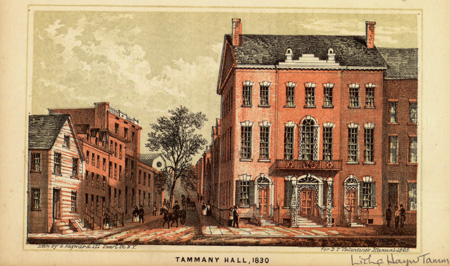Examination Days: The New York African Free School Collection

The Common-place Web Library reviews and lists online resources and Websites likely to be of interest to our viewers. Each quarterly issue will feature one or more brief site reviews. The library itself will be an ongoing enterprise with regular new additions and amendments. So we encourage you to check it frequently. At the moment, the library is small, but with your help we expect it to grow rapidly. If you have suggestions for the Web Library, or for site reviews, please forward them to the Administrative Editor.
https://www.nyhistory.org/web/africanfreeschool/. Site content developed by Anna Mae Duane and Thomas Thurston. Website developed by Columbia University Digital Knowledge Ventures. Reviewed November 2011 to January 2012.
In recent years, there has been a sharp increase in scholarly studies about the history of childhood. In 2003, for example, the Encyclopedia of Children and Childhood in History and Society (edited by Paula Fass) was published and included over 400 articles about issues pertaining to the history of children. Moreover, in 2008, the Johns Hopkins University began to publish the Journal of the History of Childhood and Youth to share new academic research about the history of children. Examining the history of childhood can be tremendously challenging, however. As leading historian of childhood Peter Stearns has pointed out, children rarely leave written records or speak for themselves.
In an effort to address the challenges of finding primary sources by and about children, a Website hosted by the New-York Historical Society showcases a treasure trove of school records created by black children in nineteenth-century Manhattan. Examination Days: The New York African Free School Collection is a beautifully designed site that provides digitized documents from New York City’s African Free School.
The history of New York’s African Free School is a fascinating one and reveals much about the experiences of African American children. White abolitionists of the New York Manumission Society founded the first African Free School in 1787 to teach children subjects like reading, arithmetic, grammar, geography, and lessons in morality. The white founders of the school had a complex relationship with the black students. Whites claimed that it was their responsibility to rescue the children from lives of primitive culture, vice, and immorality. In spite of this paternalistic bent, however, African American students and their parents embraced education, hoping that schooling would improve the future lives of black children.
Examination Days: The New York African Free School Collection contains four types of material: digitized images of students’ schoolwork, a historical overview of the African Free School, biographical sketches of black leaders who graduated from the school, and two classroom guides. The digitized images come from one of the four volumes of African Free School documents housed at the New-York Historical Society, the Penmanship and Drawing Studies, 1816-26, Volume 4. Choosing to digitize the schoolwork images seems like a wise choice given that they provide insights into the experiences of black children themselves. The Website does not showcase the other three volumes of archival material, which primarily contain meeting minutes, reports of visiting committees, and public addresses. Until now, the four volumes of material from the African Free Schools have only been available for use within the New-York Historical Society manuscript collection.
The Website is simply elegant. Developed by the Columbia University Digital Knowledge Ventures (recently reorganized as the Center for Digital Research and Scholarship), the Website is extremely easy to navigate. Users can view thumbnail images of the primary documents, which have been meticulously prepared and organized. Once a document has been selected, a larger image of the original appears along with a description of the document and a transcript. Moreover, visitors can limit their search to specific genres of schoolwork, including cartography, literary work, or mathematics.
In addition to including these digitized documents, the Website also includes a thorough historical overview of the school, including a timeline of black history in New York City and an interactive map of black New York. This contextual information helps visitors to understand the racial climate in the city when the school opened.
The Website also contains biographical sketches of prominent graduates from the school, including controversial activist Henry Highland Garnet as well as Shakespearean actor Ira Aldridge. The site also provides a biography of Charles Andrews, the white schoolmaster who was dismissed for his support of colonization. Through these short biographies, the Website reveals the historical controversies over the goals and curriculum of the African Free School.
The materials on the site are useful for both researchers and secondary teachers. The site contains two classroom guides for use with students in grades 9-12. The lesson plans are extremely thorough and include primary documents from the Website as well as clearly articulated learning activities. The lesson plans could also be used in a variety of courses, including American History, English Literature, or African American History.
Examination Days: The New York African Free School Collection should be considered a model Website for showcasing archival material for both researchers interested in the history of children and K-12 classroom use.
Jane Dabel is an associate professor at California State University, Long Beach, and editor ofThe History Teacher. She is the author of A Respectable Woman: The Public Roles of African American Women in 19th-century New York City, and is currently working on a project about the experiences of black children in antebellum New York.
